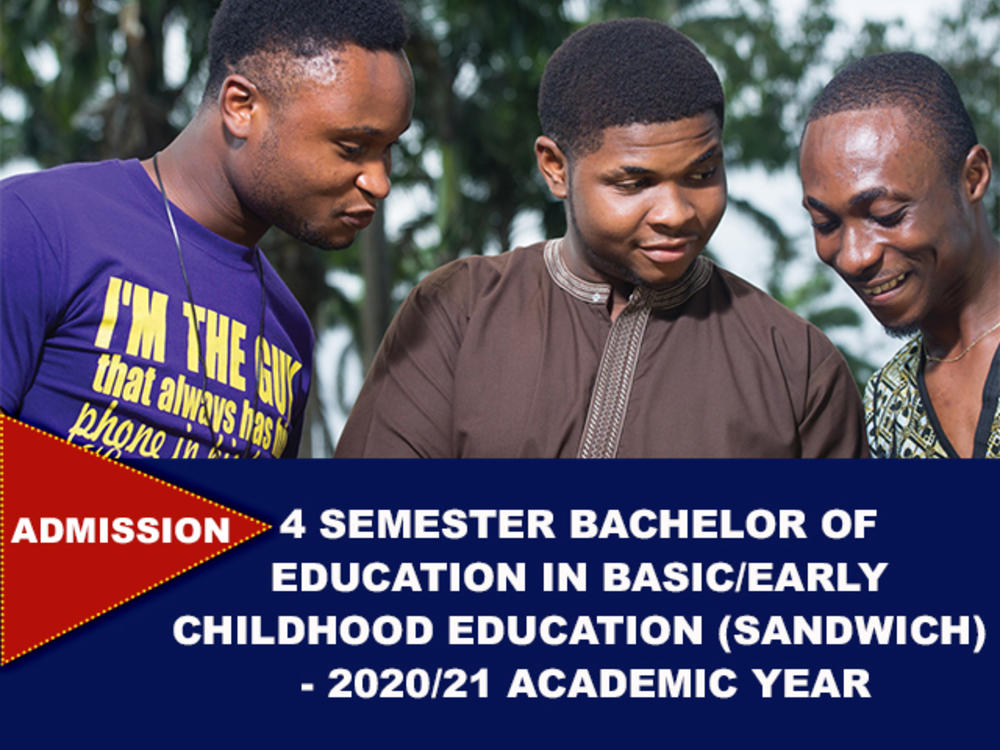
COLLEGE OF EDUCATION STUDIES
SCHOOL OF EDUCATIONAL DEVELOPMENT AND OUTREACH
INSTITUTE OF EDUCATION
APPLICATION FOR ADMISSION INTO THE BACHELOR OF EDUCATION SANDWICH PROGRAMMES - 2020/2021 ACADEMIC YEAR
The Institute of Education, University of Cape Coast wishes to inform the public that application forms for admission into the 4 Semester Bachelor of Education in Basic/ Early Childhood Education (Sandwich) for the 2020/2021 academic year are on sale and will continue until 1st May, 2020. The commencement date for the First Semester 2020/2021 programme is 1st August to 5th September, 2020
PROGRAMMES ON OFFER
· Bachelor of Education in Basic Education
· Bachelor of Education in Early Childhood Education
ADMISSION REQUIREMENT
Candidates must have a Diploma in Basic Education from any recognized institution.
All applicants should select an elective subject that conforms to what they studied at the Diploma in Basic Education level.
|
1. Catering 2. Environmental and Social Studies 3. Literature in English Language 4. Ghanaian Language Studies 5. French Language Studies 6. Mathematics 7. Technical Skills 8. Integrated Science |
Abetifi College of Education, Abetifi |
|
9. Early Childhood Education |
a. Holy Child College of Education, Takoradi b. Tumu College of Education, Tumu c. St. Monica College of Education, Mampong
|
STUDY CENTRES
Applicants who are interested in studying the under-listed programmes are to note the assigned centres
|
Programmes |
Study Centres |
|
Bachelor of Education in Basic Education |
Abetifi College of Education, Abetifi |
|
Bachelor of Education in Early Childhood Education |
|
GHANAIAN LANGUAGES ON OFFER ARE:
|
Abetifi College of Education, Abetifi
|
NB: Applicants who are visually impaired and persons with hearing difficulty can only select Abetifi College of Education study centre.
SUBMISSION OF COMPLETED FORMS
All Completed Application Forms should be sent to:
- The Director, Institute of Education, University of Cape Coast by EMS by Friday, May 08, 2020
SALE CENTRES
Applicants are to buy e-vouchers which will enable them to apply online. The e-vouchers are up for sale at the Centres listed below
· Berekum College of Education, Berekum
· Holy Child College of Education, Takoradi
· Institute of Education, University of Cape Coast
· SDA College of Education, Asokore – Koforidua
· St. Joseph College of Education, Bechem
· St. Teresa College of Education, Hohoe
· Tamale College of Education, Tamale
· Tumu College of Education, Tumu
· UCC Guest House, Tesano, Accra
· Wesley College of Education, Kumasi
Please note:
The Fees will include Tuition, Residential Accommodation and Feeding
COST OF E-VOUCHER
Purchase e-voucher at a cost of Two Hundred and Twenty Ghana Cedis (GH¢220.00)
ONLINE APPLICATIONS
a. Applicants should visit www.ucc.edu.gh and click on Apply Online
-Select: Institute of Education (Sandwich) Programmes Application
-Application Level: Select Undergraduate (Bachelor)
-Application Type: Select Inst. of Educ. Post-Dip. Sandwich (Degree)
All applicants are required to provide the following information at the back of the large EMS envelope: (a) application reference number (b) full name (c) postal address (d) first choice programme and (e) application category which should be INSTITUTE OF EDUCATION POST DIPLOMA –SANDWICH (DEGREE) programme
Applicants are advised to read application instructions as well as the contents of the admissions brochure very carefully before completing the online application form.
Applications on which APPLICATION REFERENCE NUMBERS are not indicated will not be processed.
IMPORTANT
b. Candidates are required to send the completed form to: THE DIRECTOR, INSTITUTE OF EDUCATION, UNIVERSITY OF CAPE COAST, PMB, CAPE COAST.
c. The following documents should accompany candidates' completed form:
1. For candidates who were certified by the Institute of Education of the University of Cape Coast, photocopies of Certificates authenticated by the Director of Institute of Education/Principal of a College of Education is acceptable. Candidates should obtain their transcripts and forward it to: The Director, Institute of Education, University of Cape Coast, Cape Coast.
2. For all other applicants, transcripts of the academic records should be sent to The Director, Institute of Education, University of Cape Coast, Cape Coast.
